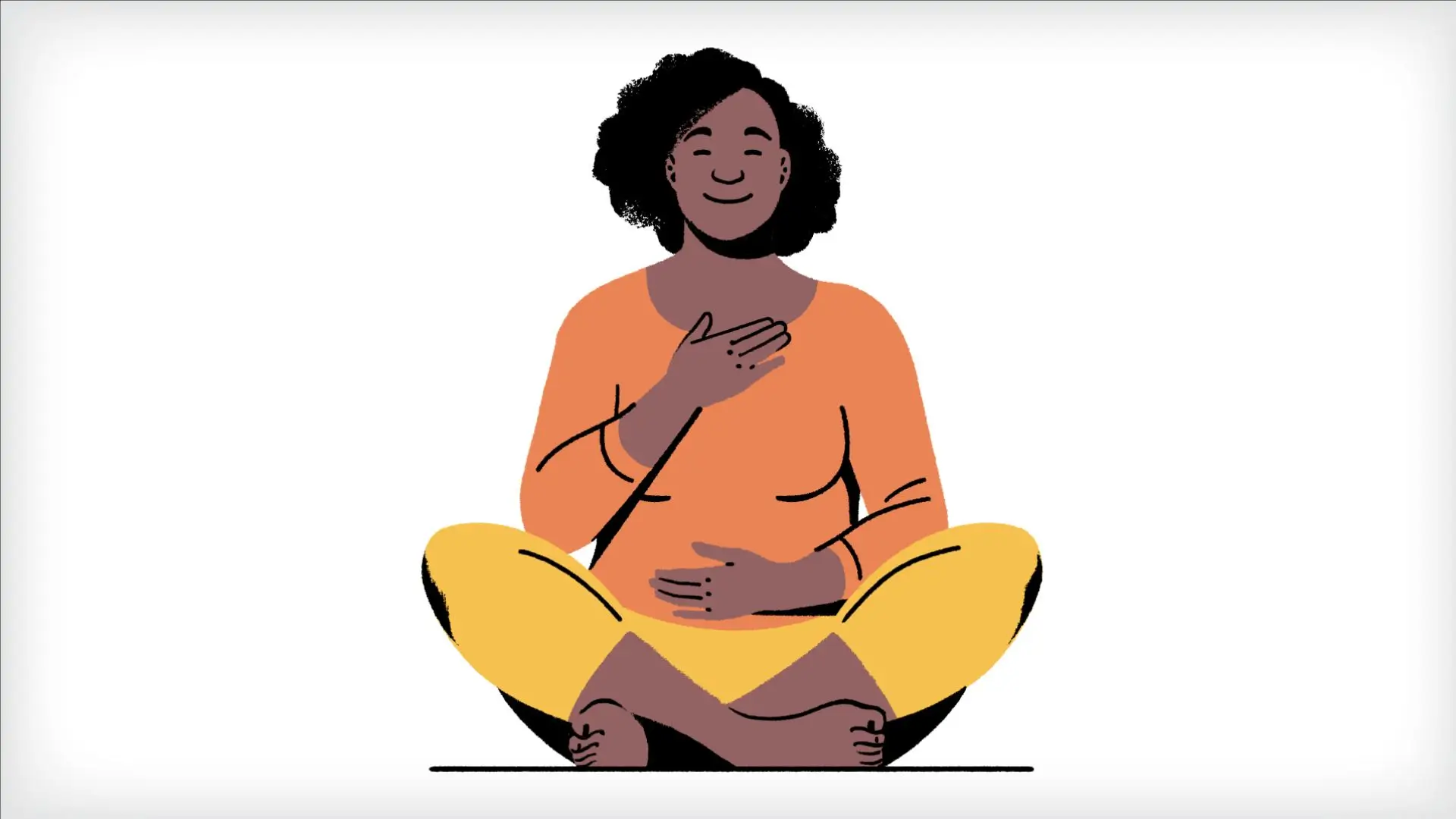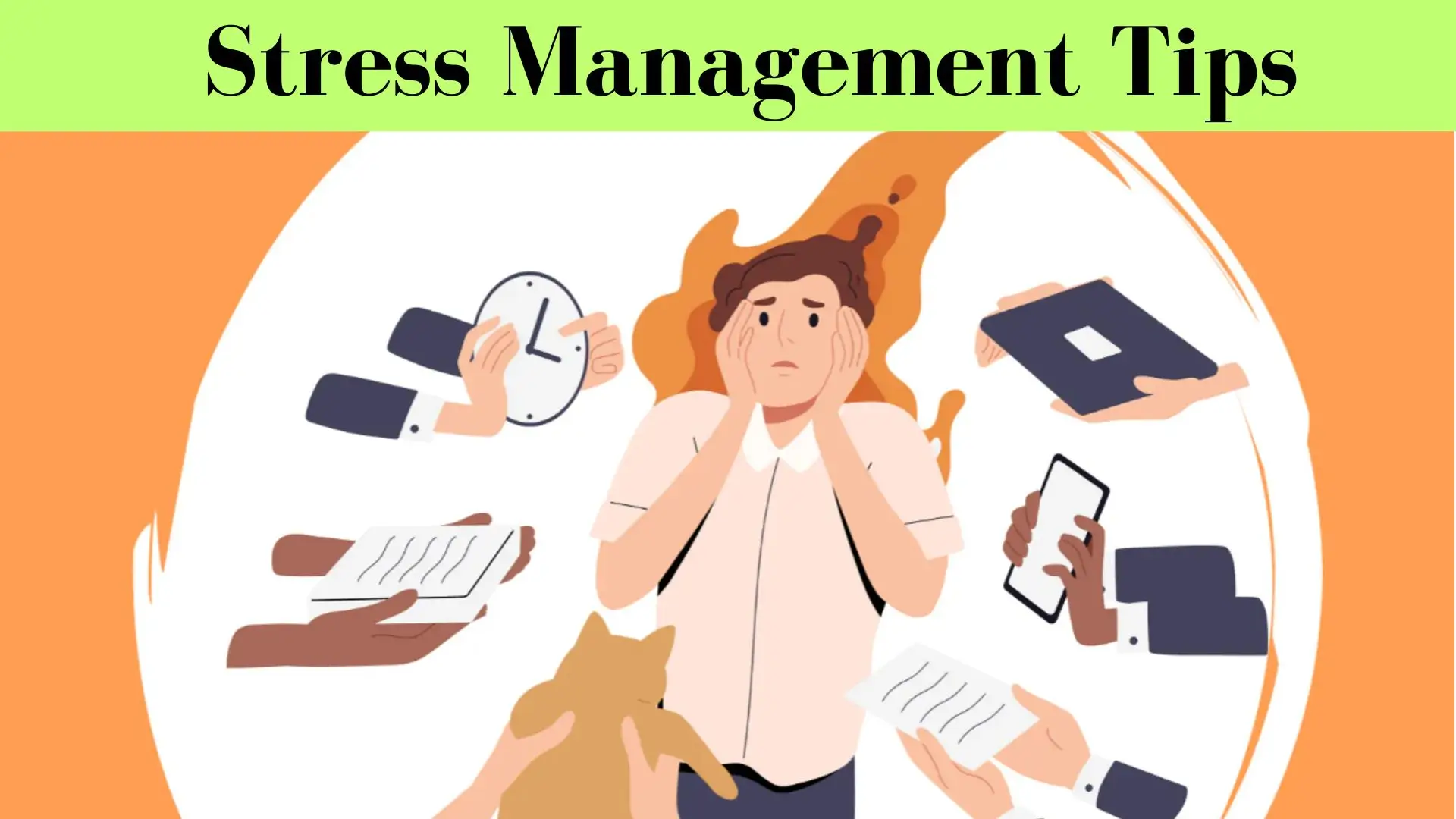Stress is a normal human reaction to both minor and major obstacles in life. Everyone goes through periods of stress. But how we handle stress has a significant impact on our general wellbeing. Stress has an impact on our bodies as well as our minds, and it can leave us feeling worn out and overwhelmed. In these situations, stress management tips can be quite helpful.
Stress, in limited amounts, can be beneficial and even useful in carrying out daily tasks. The problem arises when this stress becomes long-term and starts impacting both our mental and physical health.

What are the different types of stress?
On the basis of its intensity and duration, stress can be divided into two major categories:
1. Acute Stress
- This is short-term stress that goes away quickly.
- You may experience it when you have an upcoming exam or when you have an argument with a friend, your partner, or your parents.
- It helps you handle risky circumstances. It also occurs whenever you take on an exciting or unusual task, like scuba diving or skydiving.
- Individuals go through acute stress from time to time.
2. Chronic stress
- This type of stress continues for a long time.
- If you are continuously experiencing trouble at work, in your marriage, or with money, you may be experiencing chronic stress.
- Chronic stress is any kind of stress that lasts for more than a few weeks or months.
- Chronic stress can become so normal to you that you fail to recognize its negative effects.
- Stress management tips are helpful in dealing with chronic stress and reducing its impact on our mental health.
Common Symptoms of Stress
● Worsening of mental health conditions
● Difficulty sleeping.
● Nightmares
● Difficulty in concentrating and making decisions
● Headaches, stomach problems, body pains, and skin rashes
● Increased consumption of alcohol, tobacco and other substances
● Sudden increase and decrease in appetite
● Disbelief
● Feelings of fear, anger, sadness, worry, shock, numbness, or frustration
● Worsening of chronic health problems
What is stress management?
When we’re in a stressful situation, it’s normal to feel that there’s nothing we can do to manage our stress. We might think that there will always be never-ending responsibilities for our job and our family, that there will always be endless bills on our table, and that there will always be a shortage of time to do all these tasks. All this can make us think that there is nothing in our control, but the truth is that we actually have much more power over our lives than we think we do.
Being able to effectively manage stress allows you to become healthier, more joyful, and more productive by releasing the grip that stress has on your life. The goal that matters most is a balanced life that includes time for relationships, work, leisure, and enjoyment, as well as the ability to face difficulties face-to-face and remain positive under stress.
Read More– Overcoming Daily Anxiety: 13 Tips and Techniques
Stress Management Tips and Techniques
Learn to say “no.”
Recognize your boundaries and respect them. Taking on more than you can manage, whether in your professional or private life, is an automatic way to become stressed.
Take control of your environment.
Turn off the TV if the late-night news gives you anxiety. Consider taking a longer but less-travelled route if you get anxious in traffic. If you find grocery shopping to be an exhausting task, consider shopping online.
Exercise
Exercise is one of the most impactful stress reduction techniques. It can help lower stress levels drastically. Try the following exercises when you feel overwhelmed with stress.
- Use the stairs instead of the elevator.
- Clean your house.
- Running
- Walk instead of driving to the store.
- Aerobics
- Cycling
- Dancing
- Walk on your lunch break.
- Hand-wash your car.
- Swimming
Make a to-do list
Examine your daily tasks, obligations, and schedule. If you’re overburdened with tasks, make a distinction between the “musts” and the “shoulds.” Put unnecessary tasks at the bottom of the list or remove them completely.
Express what you feel
Express your concerns in a respectful and polite manner if someone or something is upsetting you. Frustration is bound to increase, and stress will rise if you don’t express your emotions.
Find balance.
The formula for burnout is all work and no play. Make an effort to strike a balance between your personal and professional lives, your social life and private time, as well as your everyday responsibilities and relaxation.
Look at the bigger picture
Consider the stressful circumstances from a new angle. Consider how important it will eventually be. In a month, will it matter? In a year, will it be something to get worked up about? If the response is negative, put your time and effort elsewhere.
Avoid the urge to be Perfect
One of the main causes of preventable stress is perfectionism. Give up expecting perfection; it will only set you up for disappointment. Develop fair expectations for both yourself and other people, and come to terms with “good enough.”
Practice gratitude
Take a moment to consider all the blessings in your life, including your own positive traits and abilities, when stress is bringing you down. This easy technique can help you maintain perspective.
Recognize what you cannot change
- There are some stressors that cannot be avoided. Stressors like a major illness, the death of a loved one, or a national recession are unavoidable and cannot be changed.
- Accepting things as they are in these situations is the best way to manage stress.
- While acceptance can be challenging, it’s ultimately less stressful than lashing out against something you can’t control.
- When faced with major difficulties, make an effort to see them as chances for personal development. If you made a poor decision that led to a stressful situation, reconsider it and grow from your past mistakes.
Learn to forgive
- Recognize the fact that mistakes are natural in life and that our world is not flawless.
- Give up your grudges and anger.
- Let go of the past and move on to free yourself from negativity.
Share your feelings
Even if there is nothing you can do to change the stressful situation, talking about what you’re going through can be incredibly beneficial. Speak with a dependable friend or schedule a therapy session.
Manage your time on Social Media
In addition to what you might see on social media, spending time on these platforms can be stressful. The unnecessary time spent on social media mindlessly scrolling is why a lot of individuals find it difficult to maintain a work-life balance. Using social media at night leads to increased stress, especially in adolescents, which can also cause sleep disturbances.
Take care of your Sleep
Stress often comes with the side effect of making it difficult to fall asleep. You may have insomnia if this occurs three times a week for at least three months. Insomnia is the inability to fall asleep and stay asleep.
Practice deep breathing
- The sympathetic nervous system, which regulates the body’s fight-or-flight reaction to perceived threats, can be less activated by deep breathing.
- Your parasympathetic nervous system can be activated to rest and digest by taking deep breaths that are inhaled for five seconds, held for two seconds, and then released for five seconds.
- This can help lower any general stress or anxiety you may be feeling.
Guided Meditation.
One excellent method to remove yourself from the stress of daily life is through guided meditation. You can find five minutes of focused relaxation by using one of the many guided meditations that are available online.

Belly Breathing
- Set yourself up comfortably
- Close your eyes, and rest one hand on your chest and the other on your stomach.
- Breathe deeply through your nose.
- More weight should be placed on your abdomen than on your chest.
- Now let out a breath through your nose and notice how your body begins to relax.
Learn to manage your inner critic
The voice in your head has the most influence over your stress levels. The good news is that power lies with you. Positive ideas can be replaced by negative ones. Positive self-talk offers advantages beyond just lowering stress. These include living longer, having decreased chances of having depression, being more resilient to heart disease and the common cold, and having stronger coping mechanisms for when difficult situations arise.
Biofeedback
- When stress strikes, learn how to control your blood pressure, heart rate, and tense muscles.
- Your body is equipped with sensors that detect changes in everything from muscle tone to brain wave patterns.
- By adjusting your body’s response to the sensor, you can begin to take command of the signals while working with a biofeedback therapist.
Time Management
- A lot of stress can be caused by poor time management.
- It’s challenging to remain composed and concentrated when you’re overworked and running behind schedule.
- Additionally, you’ll feel pressured to neglect or minimise all the beneficial activities you need to be engaging in to manage your stress, such as connecting with others and getting enough sleep.
The good news is that you can take steps to improve your work-life balance.
- Don’t overcommit yourself.
Refrain from planning too much into one day or scheduling too many things in one sitting. We often overlook the amount of time things will take.
● Take it one step at a time
If you feel overwhelmed by a big project, create a step-by-step plan. Instead of tackling everything at once, concentrate on one small step at a time.
● Share responsibility
It is not your responsibility to handle everything on your own at work, school, or home. Why not assign the task to someone else if they are capable of doing it? Give up trying to supervise or control every little action. In the process, you’ll be releasing extra stress.

Laugh Therapy
Laughing causes your oxygen intake to increase. Your body releases feel-good hormones, and your muscles, lungs, and heart get an adrenaline boost. Long-lasting happiness, reduced pain, and an enhanced immune system are all benefits of laughter therapy.
Some Other Quick Stress Management Tips
- tasting a piece of gum,
- smelling a specific scent,
- hugging a pet
- Spend time with a friend or family member you’re close to.
- Try not to overcommit yourself
- Looking at a favourite photo
- listening to your favourite music
A Spirico Summary
Different types of stress, such as acute stress and chronic stress, can have a significant impact on our work as well as our personal lives. Stress can have a number of symptoms like Sweating, difficulty sleeping, concentration issues, fatigue, etc.
Stress management is the skill of using certain techniques to manage everyday stress. Learning and applying stress management tips like Belly breathing, time management, journaling, controlling our responses to our environment, etc. can prove to be really beneficial in coping with and reducing stress levels.
We hope that you find this blog helpful. Have you ever tried any of these stress-reduction techniques in your life? Share with us in the comments below how they were helpful to you. We’d love to hear from you.
